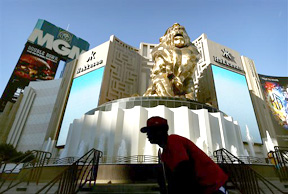LAS VEGAS: MGM Resorts International plans to shift some of its casino-resort real estate into a separate company that will lease the properties back to MGM to boost value for shareholders and give both companies more flexibility to grow.
The Las Vegas-based casino giant announced it would create a real estate investment trust, or REIT, called MGM Growth Properties LLC that would own 10 of its casino-resorts and assume $4 billion in debt.
In a conference call with analysts, MGM Resorts CEO Jim Murren said his company would own a substantial interest of about 70 percent in the new one after the company goes public with trading expected to start in the first quarter of 2016.
“We’re in it together. We want to see (MGM Growth Properties) grow, and grow rapidly,” he said.
Meghan Repko, a spokeswoman for MGM Resorts, said the deal structure differed from a spin-off since it was creating a new wholly separate company that would offer shares to the public, rather than giving shares to current investors.
On the conference call, the company reported stronger than expected third-quarter results including a $66.4 million profit, a turnaround from a loss a year ago. MGM said it earned 12 cents per share in the latest quarter due to what it described as a robust recovery in Las Vegas and a healthy convention calendar. A year ago, it lost $20.3 million, or 4 cents per share.
The company said its recently expanded convention center at Mandalay Bay is already fully booked for 2016.
The new company would own Mandalay Bay, The Mirage, Monte Carlo, New York-New York, Luxor, Excalibur, The Park pedestrian mall that’s under construction between New York-New York and Monte Carlo and three regional properties in Michigan and Mississippi.
MGM Growth Properties would effectively become the landlord with MGM Resorts its renter responsible for the cost of capital improvements, under a long-term master lease with an initial 10-year term and four five-year extensions at MGM Resorts’ option.
The company took pains to say the deal wasn’t a spin-off since it was creating a new wholly separate company that would offer shares to the public, versus the shares going instead to current investors.
MGM Resorts says it will still own and operate the Bellagio, MGM Grand and Circus-Circus properties in Las Vegas and its stakes in Las Vegas Strip City Center complex of casino-hotels and retail, MGM China, Borgata casino-resort in New Jersey and the under construction 20,000-seat Las Vegas arena.
Murren said the company looked at its options, including spinning off all its properties as suggested by a small investor earlier this year, but he said that idea “was ill-conceived on almost every front.”
The company, instead, wanted to ensure MGM Resorts would still have enough cash flow left behind that it could continue developing current projects and consider new developments.
As for keeping Bellagio, MGM Grand and Circus-Circus, Murren said all three have a lower property tax base than others MGM Resorts owns making them more attractive to retain.
The deal would leave MGM Resorts with less debt, about $7 billion not counting the amount it is responsible for in its MGM China partnership, Murren said.
The new company will also have the option to add MGM Resorts’ future casino-resorts in Maryland and Massachusetts to its portfolio.
As for capital improvements, Murren reiterated plans to rename and reposition the Monte Carlo casino-resort near its new arena and said the company is looking at adding sidewalk retail to the front of the Excalibur casino-hotel and expand convention space at the Luxor.
“These properties were designed in a different era when land was literally dirt cheap,” he said, adding that the focus is no longer on sprawling horizontal development but designs that appeal to pedestrians.
The company, its shareholders and analysts have long thought MGM Resorts was undervalued and the company had been researching shifting to a real estate investment trust structure for several months.-AP







